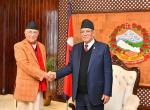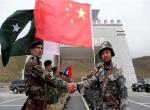The outcome of President Zardari’s unplanned private visit has been largely what any objective observer would have anticipated. It could not have broken new ground as it was not preceded by any intensive preparatory diplomacy.
The India-Pakistan relationship is neither on the edge of a precipice as it was after the Indian parliament was attacked in 2001, nor blocked as it became after the November 2008 terrorist mayhem in Mumbai.
India and Pakistan have resumed their composite dialogue. An established mechanism for discussing differences now exists, and the state of relations is being reviewed at the highest political level periodically.
Prime Minister has met the top Pakistani leaders several times abroad and in India. Zardari’s visit was therefore needed neither to deblock a stalled dialogue nor give a missing political impetus to toughly negotiated structured discussions already taking place.
In any case, he is hardly in a position to cut through all the vexed issues bedevilling bilateral ties as his own leadership in Pakistan is being contested by powerful lobbies. The visit could not therefore have been but low key in substance.
Progress in normalizing ties between the two countries has been slow because the issues are burdened by the weight of entrenched positions and deep-seated distrust. Pakistan’s complicity with terrorism is now more exposed than ever. Increasing religious radicalism in Pakistan casts a worrying shadow on India’s own internal management of its religious diversity. Almost four and half years have elapsed after the Mumbai terrorist carnage but the Pakistani authorities have side-tracked through legal obfuscations Indian demands to bring the Pakistani perpetrators to justice.
The Kashmir issue continues to distort Pakistan’s attitude towards peace with India as it is linked to the management of the civilian-military relationship within Pakistan as well as the jihadi groups that are now deeply embedded in Pakistani society. Pakistan has now added the emotive water issue to its differences with India in a way that is feeding anti-Indian paranoia in the country.
The Pakistani establishment has developed the mentality of countering India’s complaints with matching ones of their own. The Pakistani mindset has to change before its policies can change. Zardari may have good intentions and on some issues his position may be relatively more forward-looking, but that hardly warranted any excitement over the prospect of his pilgrimage visit to India delivering concrete results that have escaped the negotiators toiling for them within the framework of the “comprehensive” dialogue.
The political calculation behind the invitation extended by President Zardari and earlier by Prime Minister Gilani to Prime Minister Singh to visit Pakistan has to be analysed in this context. The Pakistani leaders know that our Prime Minister is keen to visit Pakistan and sees normalization of relations with Pakistan as the crowning glory of his political career. Vocal lobbies in India supporting such a visit facilitate Pakistan’s task in pushing for it. No persuasive reasons have been offered by this lobby to justify such a visit except vague and pious hopes that such a gesture would yield good results.
The Prime Minister is tempted but is hesitant to commit himself unless he is assured of substantial, solid results as otherwise he will be accused of political failure in dealing with Pakistan with his soft approach. He was right in telling Prime Minister Gilani that he would be glad to visit Pakistan if there was something solid to celebrate. He has conveyed to President Zardari his willingness to visit Pakistan on a mutually convenient date. This is by no means a time-bound commitment as the later Indian briefing talks of “appropriate time” and “substantive preparations”; it leaves the possibility of a visit open but a “convenient date” should depend on delivery by Pakistan on key issues of concern to India.
Pakistan is pressing for Prime Minister’s visit as the implication would be that it has delivered on the terror issue, including the trial of those responsible for Mumbai, to India’s large satisfaction, and that relations between the two countries have been effectively normalised.
The reality, however, is that after four and a half years there is no forward movement on Mumbai and Hafiz Saeed cannot be curbed because he is politically too powerful, and after the announcement of a US bounty on his head has become a hero in Pakistan as some Pakistani commentators say. On Siachen Pakistan is not willing to formally authenticate the Actual Ground Position Line as that would endorse Indian “aggression” and close any room to undo it if circumstances permit. Pakistan will not cease poisoning domestic public opinion against India on the water issue. If after the Prime Minister’s visit all these issues remain on the table as before, with what conviction would we agitate them thereafter? A premature visit by the Prime Minster is a diplomatic trap. Yes, if the inconceivable happens and Pakistan delivers on some key issues, let the Prime Minister go and justifiably celebrate that solid achievement.
At the one-on-one meeting the Prime Minister asked for the umpteenth time that Pakistan prevent terror attacks against india, try the perpetrators of the Mumbai attack and curb Hafiz Saeed, eliciting a non-committal response from Zardari who, in turn, mentioned Kashmir, Sir Creek and Siachen. All this is well worn ground, which might explain the subdued and matter of fact statements by the two leaders after their meeting, with Prime Minister speaking laconically of finding practical and pragmatic solutions to outstanding issues. Even the breakthrough on trade was not played up. There was a clear attempt by both not to hype up the results of the visit.
All said and done, President Zardari’s visit was much ado about little.
Author is Member Advisory Board at Vivekananda International Foundation and Former Foreign Secretary
Published in Mail Today 10th April 2012








Post new comment